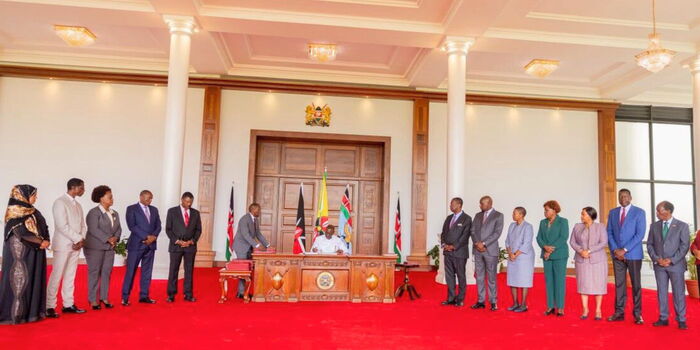Kiambu Senator Karungo Thang’wa has raised serious concerns over the Computer Misuse and Cybercrimes (Amendment) Act 2024, which President William Ruto signed into law on October 15.
The senator has written to Senate Speaker Amason Kingi, urging him to seek an advisory opinion from the courts on the legality of the law and several others signed on the same day.
In a strongly worded statement released on October 22, Senator Thang’wa accused President Ruto of breaching the Constitution by assenting to multiple Bills that he claims were never tabled before the Senate as required by law.
He stated that out of the eight Bills signed by the President on October 15, only one went through the Senate, while the remaining seven completely bypassed it.
According to the senator, this action violated Article 110 of the Constitution, which clearly outlines that any Bill touching on county governments must be considered by both Houses of Parliament — the National Assembly and the Senate.
He warned that ignoring this constitutional provision undermines the country’s system of devolution and weakens the principle of bicameralism, which ensures equal representation and checks between the two Houses.
“The Senate, which is tasked with representing and protecting the interests of the counties, was unlawfully sidelined,”
Thang’wa said. “This move not only violates the law but also strikes at the very heart of devolution, which is one of the key foundations of our Constitution.”
Among the Bills he listed as having bypassed the Senate include the Computer Misuse and Cybercrimes (Amendment) Bill, 2024, the Privatisation Bill, 2025, and the Virtual Asset Service Providers Bill, 2025.
Others are the Wildlife Conservation and Management (Amendment) Bill, 2023, the National Police Service Commission (Amendment) Bill, 2024, the Air Passenger Service Charge (Amendment) Bill, 2025, and the National Land Commission Acts (Amendment) Bill, 2023.
Thang’wa insisted that these pieces of legislation directly affect county governments and should have been reviewed by the Senate before being assented to.
He warned that failure to do so makes the entire process unconstitutional and could render the new laws invalid.
The senator called on the Council of Governors, civil society organizations, youth movements such as Gen Z, and other constitutional watchdogs to step in and help safeguard the legislative process from being undermined.
He urged the Senate leadership to immediately move to the courts for an advisory opinion under Articles 110, 111, 112, and 163 of the Constitution, to determine the legality of the President’s actions.
“The Senate leadership must urgently seek an advisory opinion from the courts on the constitutionality of these Acts,” he said, emphasizing that the issue goes beyond politics and touches on the rule of law.
He further appealed to Kenyans to remain alert and united in defending constitutionalism. “The Council of Governors, civil society, Gen Zs, patriots, and constitutional watchdogs must stand firm in protecting the integrity of our legislative process,” Thang’wa added.
His statement follows a recent move by the Kenya Human Rights Commission (KHRC) and gospel artist-turned-activist Reuben Kigame, who filed a petition in the High Court challenging the legality of the Computer Misuse and Cybercrimes (Amendment) Act, 2024.
The petitioners argue that the National Assembly made a grave procedural mistake by failing to involve the Senate during the passage of the Bill.
They maintain that since the law has provisions that touch on county governments, it required joint consideration by both Houses of Parliament. The petition describes the omission as a “procedural defect” that makes the entire law unconstitutional.
The controversy around the Cybercrimes law has continued to draw mixed reactions from different stakeholders, with many warning that ignoring due process could set a dangerous precedent for future legislation.
Join Government Official WhatsApp Channel To Stay Updated On time
https://whatsapp.com/channel/0029VaWT5gSGufImU8R0DO30


